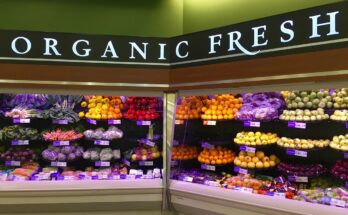Do you ever stop to think about the journey your food takes before it reaches your plate? Food processing plays a crucial role in the economy, impacting various sectors and creating numerous job opportunities.
From the moment crops are harvested or animals are raised, food processing steps in to transform raw materials into safe and nutritious products. This not only contributes to the agricultural sector but also ensures food availability and accessibility for consumers.
Additionally, food processing has a significant role in international trade and export, as processed goods are in high demand worldwide. This industry has the potential to drive economic growth and development, allowing countries to tap into new markets and increase their revenue.
So, the next time you enjoy a delicious meal, remember the vital role that food processing plays in sustaining our economy and enhancing our lives.
Contribution to Agricultural Sector
Did you know that food processing plays a crucial role in boosting the agricultural sector’s growth? It is an essential component that adds value to raw agricultural products, ensuring their longevity and increasing marketability.
Food processing not only helps in preserving perishable food items, but it also enhances their nutritional value, taste, and appearance. By converting raw materials into processed food products, it creates employment opportunities, especially in rural areas, and contributes significantly to the overall economy.
Additionally, food processing helps in reducing post-harvest losses, which can be substantial in developing countries. It also facilitates the export of processed food products, thereby generating foreign exchange and improving the country’s balance of trade.
In conclusion, food processing is a vital sector that supports and strengthens the agricultural industry, leading to overall economic growth.
Job Creation and Employment Opportunities
The creation of jobs and employment opportunities in the food processing sector is a crucial component of economic growth. When food processing companies expand their operations, they require a larger workforce to handle the increased production. This leads to the creation of new jobs in various positions, such as food technicians, quality control inspectors, machine operators, and packaging specialists.
Additionally, the growth of the food processing industry also creates indirect employment opportunities in related sectors, such as transportation, logistics, and packaging material manufacturing. These jobs provide a steady income for individuals and support their families, contributing to overall economic development.
Moreover, with the advancement of technology, there is a demand for skilled workers who can operate and maintain sophisticated machinery used in food processing. Therefore, the food processing sector plays a vital role in providing employment opportunities and driving economic progress.
Impact on Food Availability and Accessibility
With the expansion of the food processing sector, access to nutritious food has become more readily available and easily accessible to communities. Food processing plays a crucial role in ensuring that a wide variety of food products are made available to consumers, regardless of their location.
This is particularly important in remote areas where fresh produce may be scarce or expensive. Through food processing, perishable items can be preserved and transported over long distances, extending their shelf life and making them more affordable.
Additionally, food processing allows for the creation of convenient and ready-to-eat meals, which can be especially beneficial for individuals with busy lifestyles.
Overall, the impact of food processing on food availability and accessibility has greatly improved the ability of individuals and communities to access nutritious and affordable food options.
Role in International Trade and Export
Through food processing, countries are able to ship out their unique and flavorful culinary creations to eager taste buds around the world. Food processing plays a crucial role in international trade and export, as it allows countries to expand their markets and increase their economic growth.
By processing and preserving food, countries can extend the shelf life of their products, making them suitable for long-distance transportation. This enables them to reach consumers in different countries, promoting cultural exchange and economic cooperation.

Additionally, food processing enhances the export capabilities of countries by adding value to their agricultural products. By transforming raw materials into processed goods, countries can access new markets and create new opportunities for farmers and food manufacturers.
In this way, food processing contributes to the growth of international trade and strengthens the global economy.
Potential for Economic Growth and Development
By harnessing the transformative power of food processing, countries can unlock a world of economic opportunities and pave the way for sustainable growth and development.
Food processing has the potential to create jobs, boost incomes, and improve living standards. When food is processed, it can be stored for longer periods, reducing wastage and ensuring food security. Additionally, processed food products have a longer shelf life, making them suitable for export and increasing a country’s earning potential.
Food processing also leads to the development of related industries, such as packaging, transportation, and marketing, which further contribute to economic growth. Moreover, investing in food processing technology and infrastructure can attract foreign direct investment and promote technological advancements.
Overall, the potential for economic growth and development through food processing is immense and should be harnessed to maximize its benefits.
Conclusion
In conclusion, you now have a better understanding of the crucial role that food processing plays in the economy.
Whether it’s by contributing to the agricultural sector, creating jobs and employment opportunities, ensuring food availability and accessibility, or driving international trade and export, food processing has immense potential for economic growth and development.
So, next time you enjoy a processed food product, remember the significant impact it has on our economy.




